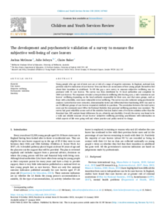Young people who age out of state care are at risk of a range of negative outcomes. In England, national data provides only five indicators of care leavers’ lives and there are no measures of how young people themselves feel about their transition to adulthood. To fill this gap a new survey to measure subjective wellbeing was coproduced with 31 care leavers. The survey was then distributed by 21 local authorities and completed by 1804 care leavers.
The responses revealed a steep decline in wellbeing after leaving care, a wide variation in care leavers’ wellbeing depending on the local authority responsible for their care, and that some groups, such as those with a disability, were more vulnerable to low wellbeing. The survey was also validated using psychometric analyses. Latent factors were extracted, dimensionality tested and differential item functioning (DIF) was used to see if different groups of care leavers responded similarly to questions.
The association between the total survey score and the commonly used Office for National Statistics four personal wellbeing questions was examined. The survey had good reliability across each of the statistics but data loaded onto a five-factor solution rather than the theorised four. DIF analysis found differences by sex, ethnicity and disability.
Overall, the survey was found to be a valid and reliable measure of care leavers’ subjective wellbeing providing practitioners with information on which aspects of life were going well and where practice and policy needed to change.

